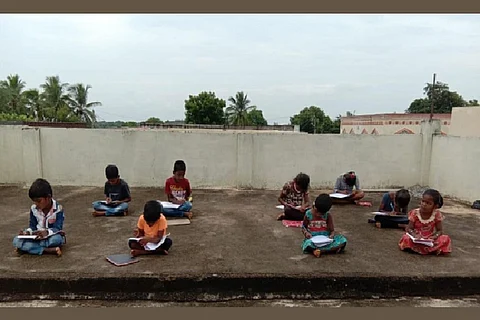

We know that education plays a very crucial role in one's life regardless of age, caste, class, creed, gender, religion, region and so on. But what really defines it, is its accessibility, especially in the context of the caste system in India. Education is inseparable and has become a part of the necessary requirements of life like food, shelter and clothing.
Education has the power to destroy inequalities that exist in society and has the capacity to bring everyone on one platform. Since the COVID-19 pandemic arrived, schools have shut and students from rural backgrounds and marginalised communities have been left without access to education.
The pandemic has interrupted all walks of human life, but especially the lives of marginalised communities, as they were predominantly subjected to menial jobs. Students from these communities can’t afford online education as some don’t get good internet connectivity, while others can’t afford the gadgets necessary, due to the financial crisis. This pandemic is an addition to the already existing baggage in their lives.
In a way, the pandemic has exposed existing social inequalities in India and students from marginalised communities suffer more as accessing online education is a challenge.
This is when Village Learning Circles (VLCs) come into the picture. Students from across the districts in Telangana have started tutoring their peers each day. With enormous support from parents, they are able to transform their rooftops, verandahs, temples, schools, playgrounds, agricultural lands and other community spaces into classrooms, while ensuring that COVID-19 safety measures are met.
The idea is that every individual shall incorporate skills to educate each other in order to transmute society if they are provided with opportunities; even poverty is not a barrier.
The idea of initiating VLCs came from Swaero-Circles, which emerged in 2017. Swaero-Circles is an NGO-based organisation and functions in many districts in Telangana. Children from socially and economically backward communities attend the classes hosted by Swaero-Circles, especially those, whose parents are illiterate and cannot contribute to their child’s formal education.
Facilitators from within the community, called Commanders, take up the initiative to run Swaero-Circles completely on a voluntary basis. They conduct physical fitness sessions in the morning (to ensure that children are physically fit) and teach academics in the evenings in their own colonies (for better educational outcomes of the child).
The tuition provided by Swaero-Circles has a major impact on the children to pursue higher education, even if their parents tend to discourage them from doing so due to poverty or lack of awareness. Swaero-Circles helps in convincing parents to send their children for higher education. It also helps the students financially as they pursue their higher education, as members in the circles collect money on a voluntary basis from the community.
The circles have grown widely. Children from both Telugu-medium and English-medium and from government schools and private schools, attend the classes. As children come from different educational backgrounds, it also helps them engage in mutual learning.
It creates a platform where children learn from within, without any bias in terms of caste, class, religion and region. No one labels them as slow-learners or failed candidates and so on. Everyone treats and greets them with great respect, love, care and concern. Youth, who are performing well in their professional life, visit once in a while to motivate the children and make sure that they guide them in the right direction.
To ensure that quality education is imparted irrespective of any socio-economic barriers, every school, teacher, parent and community should hold responsibility, accessibility, and accountability on their roles while designing the plans for education.
When everyone collectively tries to implement their role without any discrepancies, then education acts as a tool to achieve a better society and overcome social inequalities.
Circles make sure to introduce the students to the outside world in their respective fields of interest through competitions and cultural programmes. It helps the child to recognise their skills, to excel in life. Creative activities play a vital role to help them build confidence and perseverance. Collaboration makes them realise their accountability and contribution when they are involved in group activities such as singing, dancing, group discussions and so on.
Education is the most potent tool for socioeconomic mobility and a key instrument for building an equitable and just society. Education also strengthens democracy by imparting to citizens, the tools needed, to fully participate in the process of governance. Frequent interaction between facilitators, students and parents may accelerate the demand for schooling by taking into account everyone's decision while executing plans and policies.
Also parallelly, institutions like VLCs should spread across India and the world to achieve
Having said this, it is incredible to see little kids (who are the primary beneficiaries of Swaero-Circles) growing in the right direction, where they become enthusiastic enough to take strides in leadership. Despite their age, taking a bold step to initiate VLCs in their respective geographical locations to teach their friends and younger ones is commendable. In the near future, undoubtedly, it will play a key role to achieve better educational outcomes.
“A good man cannot be a master and a master cannot be a good man” - Dr B.R.Ambedkar.
The writer is a Post Graduate of Azim Premji University, Bengaluru and a first-generation product of the Swaeros movement. Views expressed are the author's own.